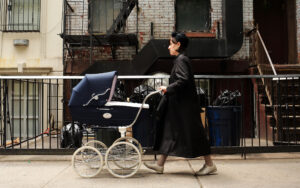When more than 100,000 people marched in Paris against antisemitism on 12 November, one participant attracted particular notice: Marine Le Pen, leader of the far-Right Rasssemblement National (“National Rally”). As many recall, the party’s founder, and her father Jean-Marie, was himself a notorious antisemite, and counted veterans of the Waffen SS among his early cadres. Was it possible that Marine’s party had showed up for the wrong march?
In fact, the RN leader has been denouncing a “new antisemitism” for many years, and trying to build Jewish support for the party. She instigated the party’s greatest rupture with its own past in 2015 when she expelled Jean-Marie from it, and has increasingly sold herself as French Jews’ “shield against Islamist ideology”, in the words of her co-leader, Jordan Bardella. But for much of France, the far-Right is still built upon and tainted by antisemitism. Le Pen’s change of position is certainly strategic; whether it is a genuine change of heart is a different question. But the contradiction is telling: it is of a piece with the complex and paradoxical history of the Jews in France, stretching back many centuries.
At first glance, this history can seem overwhelmingly dark. During the Middle Ages, French Jews suffered frequent pogroms, blood libels, and expulsions from the country. After the last of these, in 1394, Jews did not return to France for centuries. As late as the 18th century, the Alsatian town of Colmar imposed a tax equally on all Jews and heads of cattle entering the town. In 1808, Napoleon Bonaparte issued the so-called “Infamous Decree” that presumed all Jews in eastern France guilty of illicit business practices, unilaterally cancelled debts to Jews, and restricted Jewish movement and commerce. In 1832, the betrayal of a charismatic royalist leader by a Jewish-born advisor unleashed a torrent of antisemitic hatred.
Worse was to come. A new wave of antisemitism began in the late-19th century, propelled by Édouard Drumont’s vile 1886 book La France juive, one of the greatest bestsellers in French history with over 100 reprints in just its first year. In 1894, the conviction of Jewish army officer Alfred Dreyfus on trumped-up treason charges prompted yet more ferocious attacks on Jews, many of the worst rhetorical ones delivered from church pulpits. Even after irrefutable proof of Dreyfus’s innocence came to light, a second trial confirmed his conviction, and he did not win his exoneration until 1906.
Then, in 1940, the antisemites achieved real power. Following the Nazi Blitzkrieg, the Germans occupied much of France, but allowed a quasi-independent state to survive in the south, headquartered in the former spa town of Vichy. Acting on its own initiative, the Vichy government banned Jews from most professions, forced them to wear yellow Stars of David, seized property, and ultimately deported some 76,000 to the death camps. Its emblematic figure was the half-mad Louis Darquier, subject of Carmen Callil’s remarkable biography, who headed its General Commission of Jewish Affairs and helped organise an infamous roundup of Jews in Paris in 1942. After the war he claimed, from his refuge in Franco’s Spain, that only lice had died in the Auschwitz gas chambers.
Yet alongside this history there developed another one running in parallel — very different, and considerably more hopeful. Already in the late-18th century, influential French writers such as Henri Grégoire were arguing in favour of full civil rights for the Jews. And these rights were actually granted in the early years of the French Revolution. Even as Napoleon passed the “Infamous Decree”, his armies were demolishing ghetto walls in central Europe. He also set up a system of “consistories” to mediate between French-Jewish communities and the government that has survived to the present.
The Third Republic established in the 1870s opened up unprecedented opportunities for Jews in French politics, business, law and academia. At a time when Jews were still largely banned from American universities, figures such as Émile Durkheim and Henri Bergson rose to the heights of the French university system. Jewish families like the Camondos, the Ephrussis, and the Rothschilds compiled massive fortunes, and used them to build elegant townhouses and villas full of rare art that they later bequeathed to the French state, as James McCauley recounts in his study The House of Fragile Things. In French Algeria, Jews gained full French citizenship in 1870, a status unavailable to most Muslims. The Dreyfus Affair, painful as it was for French Jews, did end in Dreyfus’s exoneration. In the late-19th and early-20th centuries, France welcomed hundreds of thousands of Jewish immigrants. Today, France has the third-largest Jewish population in the world, after the United States and Israel.
To be sure, even some of these apparently favourable turns of fortune were hardly unalloyed. Henri Grégoire, the champion of Jewish civil rights, nonetheless described the Jews as a degraded and clannish people, and saw their emancipation as a step not only towards full assimilation, but towards their ultimate conversion to Christianity. The authors of the French Revolutionary rights legislation, meanwhile, insisted that the Jews “must make up neither a political body nor an order within the state”. In other words, they needed to restrict their Judaism and Jewish identity entirely to the realms of private life and private conscience.
These principles have endured to the present, and do much to govern the lives, not only of Jews, but of other minority groups in France as well (especially, today, Muslims). The French “melting pot” does not allow for what Americans call “hyphenated” groups (such as Italian-Americans or Polish-Americans) whose strong sense of community identity helps to shape civil society in general. This is one reason why, even if France has had many notable Jewish writers and artists, few of them wear their Jewishness on their sleeves in the manner of a Philip Roth or Woody Allen. Meanwhile, the patriotic generosity of families such as the Camondos did not save them from Vichy’s persecutions — and even deportation to the death camps.
In the past few decades, the history of both French Jews and French antisemitism has taken a radically new turn, in both cases thanks to immigration from North Africa. On the one hand, decolonisation, coupled with rising antisemitism in the Arab world, brought hundreds of thousands of Sephardi Jews to the French metropole, where they soon outnumbered the older Ashkenazi communities of largely Alsatian and Eastern European origin. And the migration of much larger numbers of North African Muslims led to the establishment of communities in which many people principally associate Jews with Israel.
Since the Eighties, the perpetrators of the most serious antisemitic attacks in France have been Muslims who have seen their actions as an extension of the Middle East conflict. These attacks include everything from assaults on a synagogue and a well-known Jewish restaurant by Palestinian terrorists in the early Eighties, to the numerous murders of Jews by radicalised young French Islamists, including at a kosher supermarket in January 2015. The Jewish victims have been largely Sephardi. The principal target of the horrific November 2015 attacks by Isis terrorists was the Bataclan theatre, which had just been sold by its long-term Jewish owners. In this context, it is not surprising that far-Right leaders such as Marine Le Pen now rush to defend France’s Jews. If anything, their Islamophobia has trumped their residual antisemitism.
With the Israel-Hamas war, antisemitic incidents in France have risen once more. There are stories across France of Jewish men covering their kippas and Jewish families removing the mezuzahs from their doorways. The November 12 march offered a welcome response. But with world attention already swivelling to Israeli tactics in Gaza, and Hamas’s horrendous October 7 attacks already receding in memory, this sort of public support for French Jews may also soon fade. The resolutely anti-Israeli socialist Jean-Luc Mélenchon refused to join the march, and his point of view resonates with much of the French Left, and may well become more popular. But however the situation develops, onlookers should resist the easy temptation to see it as the simple continuation of French-Jewish history — this history defies the simple interpretation that would suit either side.
Disclaimer
Some of the posts we share are controversial and we do not necessarily agree with them in the whole extend. Sometimes we agree with the content or part of it but we do not agree with the narration or language. Nevertheless we find them somehow interesting, valuable and/or informative or we share them, because we strongly believe in freedom of speech, free press and journalism. We strongly encourage you to have a critical approach to all the content, do your own research and analysis to build your own opinion.
We would be glad to have your feedback.
Source: UnHerd Read the original article here: https://unherd.com/




